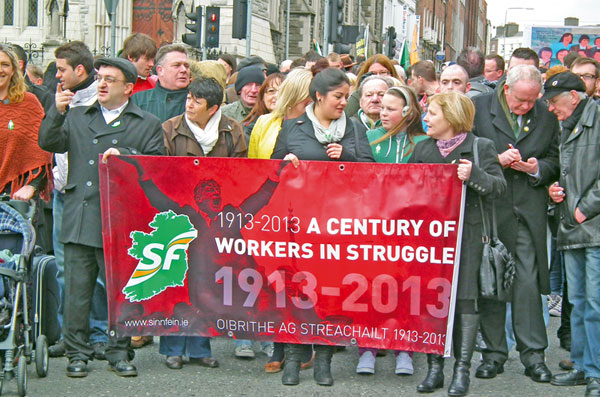28 April 2013 Edition
Reflections after Meath East
Another View

• Our party wants to be in government in the South
If we want to avoid the fate of the Labour Party, then we need to learn from their mistakes too
MUCH of the conversation between delegates at this year’s Sinn Féin Ard Fheis was about the party’s result in the Meath East by-election.
For some it was a good result. Despite an unknown candidate, a weak local organisation, a poor electoral record and a short campaign, Darren O’Rourke polled well. He increased the party’s share of the vote to 13%, came in a strong third and established himself as a credible contender for future electoral success.
For others, it was a little disappointing. Despite widespread anger with the Government and a massive drop in support for Labour, a four-point increase on the 2011 general election result was less than expected. Many people who we believe should have voted for Sinn Féin chose to stay at home.
Of course, these are not too opposing arguments. They represent differences of emphasis and expectation. And in the case of this writer, they are held simultaneously.
The conclusion to many of the Ard Fheis Meath East conversations was that Sinn Féin is making progress but that we have a lot more work to do.
In the coming months, activists in the South will be increasingly preoccupied with preparations for the 2014 local elections. Immediately after that we will be into the next general election campaign.
These electoral battles will have to be fought by an activist base already busy with campaigns against the Family Home Tax and promoting a Border poll.
There will be little time left to carve out space for discussions on crucial strategic questions. But carve out that space we must. And when we do two issues must be central to our deliberations.
What is our route to power in the South?
This is not just a question of how to win seats or who we would share office with. Rather it is a broader discussion. What kind of social and political alliances do we want to build? Are we sufficiently equipped with the skills, knowledge and organisation required to win power? Do we really have a credible social and economic alternative that can be delivered?
What will we do when we get power in the South?
What are the legislative, policy and institutional changes we want to make during our first term of office? How will we raise the revenue to deliver them? Are the necessary social and community forces mobilised in support of these changes? Will they be strong enough to overcome those who will continue to defend the status quo?
As our experience in the Assembly demonstrates, getting into office is the easier part (though it didn’t feel like it at the time). Knowing what to do when you get there and getting what you set out to achieve is much more difficult.

• Sinn Féin in government must not repeat the mistakes of predecessors on the Left
We are not unique in this. There are many examples of progressive political parties entering government during the last 20 years only to realise that there is a big different between holding office and wielding power.
The experience of left-wing governments in France in the early 1980s, Italy and Sweden in the 1990s, and Norway and Iceland today offer many valuable lessons.
The fact that these governments were more often known for their failures than their successes makes those lessons even more useful.
We can only avoid repeating their mistakes if we know and understand this history and use it when developing our own strategies and plans.
Sinn Féin is in government in the North; our party wants to be in government in the South.
The question is not whether we will get there. It is when we get there how do we ensure we do not repeat the mistakes of Left republican predecessors such as Clan na Poblachta or the Workers’ Party/Democratic Left or our progressive European counterparts.
These are questions that all activists must be discussing today. They cannot be left until we are about to enter government. Nor can they be left to a small group of party strategists at the centre.
This is the other lesson of the Meath East by-election. If we want to avoid the fate of the Labour Party, then we need to learn from their mistakes too.




